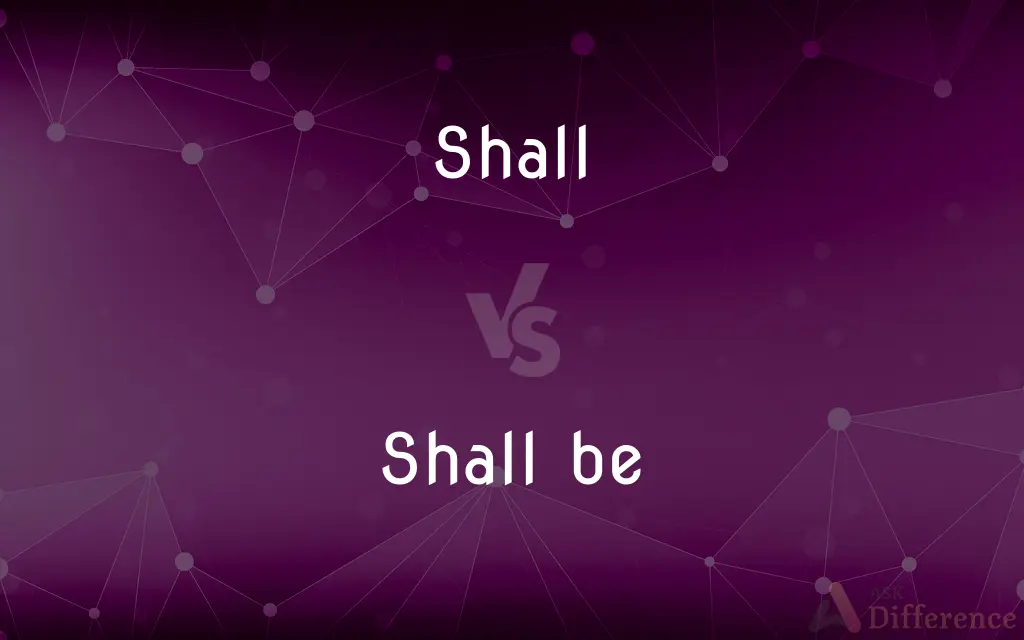Shall vs. Shall be — What's the Difference?
By Tayyaba Rehman — Published on January 29, 2024
"Shall" expresses determination or obligation, often used in formal or legal contexts. "Shall be" is a future tense form, indicating something that is expected to happen.

Difference Between Shall and Shall be
Table of Contents
ADVERTISEMENT
Key Differences
"Shall" is a modal verb often used to express strong intention or determination, particularly in formal or legal texts. It's commonly used in first person ("I shall", "we shall") to denote a strong intention. "Shall be", on the other hand, is the future tense form of "shall", used to indicate something that is expected or scheduled to happen in the future. It is often used in third person contexts, such as "he shall be", "it shall be".
In legal and formal documents, "shall" is used to express an obligation or a requirement. It is more definitive and binding than other modal verbs. "Shall be" in legal texts often indicates a future state that is required or mandated, for example, "The contract shall be signed by both parties."
When it comes to general usage, "shall" can be used in questions to offer or suggest, as in "Shall we dance?". "Shall be" is used less frequently in everyday conversation and is more common in written, formal, or legal contexts to describe future conditions or states.
The tone conveyed by "shall" and "shall be" can differ. "Shall" can have a tone of formality or even command, while "shall be" is more neutral, simply describing a future state without the implication of command or intention.
It's important to note that in modern English, especially in American English, the usage of "shall" and "shall be" has become less common, often replaced by "will" and "will be" in everyday conversation. However, "shall" and "shall be" remain important in legal, formal, and contractual contexts due to their traditional implications of obligation and certainty.
ADVERTISEMENT
Comparison Chart
Basic Use
Expresses determination, intention, or obligation
Indicates a future state or condition
Common Context
Formal, legal, first person
Formal, legal, third person
Implication
Stronger intention or requirement
Future state that is mandated or expected
Tone
Can imply command or strong suggestion
Neutral, descriptive of future conditions
Modern Usage
Less common, replaced by "will" in everyday speech
More formal, used in legal or formal contexts
Compare with Definitions
Shall
Offers or suggests in questions.
Shall we go to the movies tonight?
Shall be
Describes future actions or requirements.
All submissions shall be made electronically.
Shall
Sometimes replaced by will in modern usage.
I shall (will) call you later.
Shall be
Used in formal or legal texts.
The agreement shall be reviewed annually.
Shall
Used in legal context for obligations.
The tenant shall pay rent on the first day of each month.
Shall be
Less common in everyday conversation.
There shall be a celebration after the ceremony.
Shall
Expresses intention or determination.
I shall complete the project by Monday.
Shall be
Indicates a future condition or state.
The meeting shall be held at noon.
Shall
Formal tone, especially in first person.
We shall overcome these challenges.
Shall be
Often used in third person contexts.
He shall be responsible for the delivery.
Shall
Used before a verb to indicate the simple future tense in the first person singular or plural.
I shall sing in the choir tomorrow.
I hope that we shall win the game.
Shall
Used similarly to indicate determination or obligation in the second and third persons singular or plural.
(determination): You shall go to the ball!
(obligation): Citizens shall provide proof of identity.
Shall
Used in questions with the first person singular or plural to suggest a possible future action.
Shall I help you with that?
Shall we go out later?
Let us examine that, shall we?
Shall
(obsolete) To owe.
Shall
To owe; to be under obligation for.
Shall
To be obliged; must.
Common Curiosities
Is "shall be" binding in contracts?
Yes, it indicates required future actions or states.
Can "shall" and "shall be" be used interchangeably?
Not exactly, as they have different implications.
Can "shall" be used in informal contexts?
It's rare and usually replaced by "will".
Is "shall" still commonly used?
It's less common in everyday speech but still used in formal contexts.
Why is "shall" important in legal documents?
It conveys obligation and intention with more certainty.
Does "shall be" imply a future obligation?
Yes, it indicates something that is expected to happen.
In what context is "shall be" most appropriate?
In formal, legal, or third person scenarios.
Can "shall be" be used for predictions?
It's less about prediction and more about obligation or future states.
Is "shall" used in questions?
Yes, often in offers or suggestions, like "Shall we dance?"
Is "shall" used in first person scenarios?
Traditionally, yes, particularly to express strong intention.
How does "shall" differ from "will" in legal terms?
"Shall" is often seen as more mandatory than "will".
Are there modern alternatives to "shall"?
"Will" is often used as a more modern alternative.
Does "shall" have a formal tone?
Yes, it often conveys a formal or authoritative tone.
Why might "shall be" be preferred in formal writing?
For its clarity in describing mandated future conditions.
Is "shall" used differently in British and American English?
Yes, it's more common in British English and formal American English.
Share Your Discovery

Previous Comparison
Cello vs. Double Bass
Next Comparison
Ecology vs. Environmental ScienceAuthor Spotlight
Written by
Tayyaba RehmanTayyaba Rehman is a distinguished writer, currently serving as a primary contributor to askdifference.com. As a researcher in semantics and etymology, Tayyaba's passion for the complexity of languages and their distinctions has found a perfect home on the platform. Tayyaba delves into the intricacies of language, distinguishing between commonly confused words and phrases, thereby providing clarity for readers worldwide.
















































